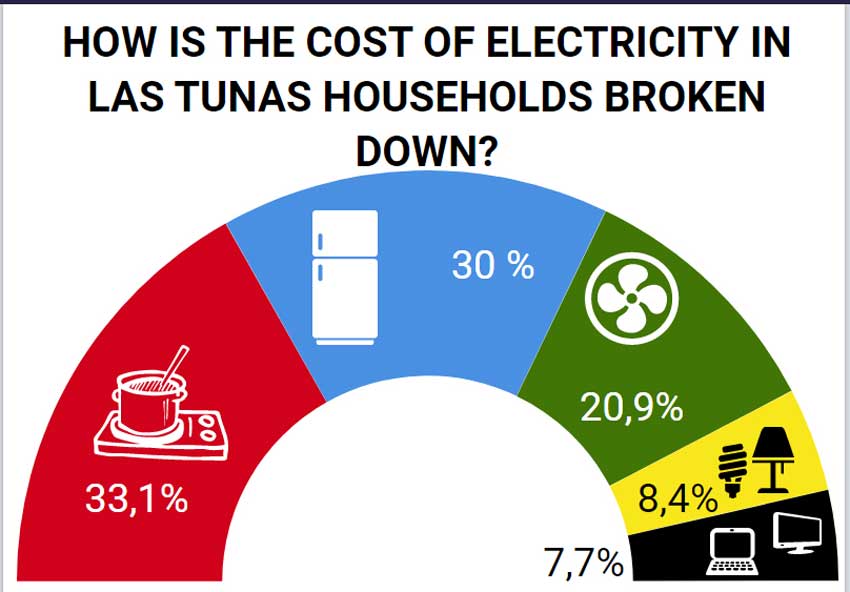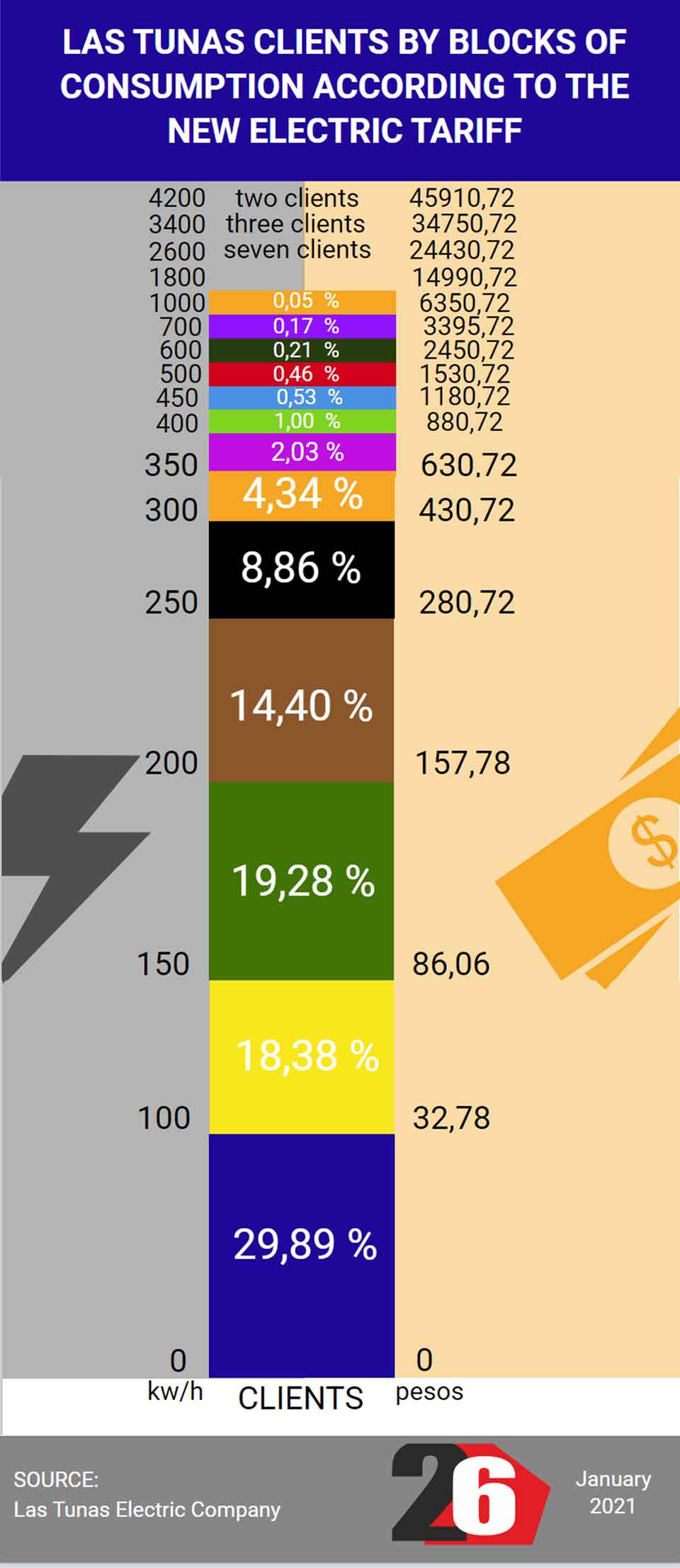
One of the most controversial points in the monetary re-ordering has been, without a doubt, the new electricity tariff, whose definitive version has been in force since January 1st.
Las Tunas, Cuba - The issue not only brought to light the Cuban government's willingness to listen to the genuine concerns of the citizens, but also placed the latter in front of the undeniable fact of paying attention to energy consumption.
TRIVIAL ISSUE?
It is only in its absence that the majority of the people are aware of how essential electricity is to their daily lives. At the same time, the high degree of state subsidy to that service certainly did not place savings as one of the priorities of individual consumers. René Díaz Yaudis, a resident of the Santos neighborhood in Las Tunas city, says that very few people read the meter in his building. "We don't consume much electricity, so we didn't think it was necessary," he says. Dayanis Martínez has the same perception. In her house, nobody checks the electricity costs and although she confesses that she would like to do so, under the teachings of her grandfather Oberto Jimenez, "he does it on a daily basis," but her intentions only go so far.
Even among private entrepreneurs, electricity expenses have not been a concern until now. "When the man who brings the electricity bill arrives, we pay and that's it," admits Maricela Peña Peña, owner of the Rio Chico restaurant in this city. "However, I stopped using some equipment when the energy shortage came ". His colleague Yadir Pérez Cabrera, owner of the bar-restaurant Caché, expresses himself in similar terms.
"Now, he says, we must save, but only with the equipment that is unnecessarily turned on. Our priority is to guarantee good service and that requires a good climate and equipment in the kitchen working so that the orders come out on time."
Something very different happens with state institutions and companies that are subject to strict controls on their electrical consumption. Only in this way was it possible that, except for specific interruptions and quick solutions, the Electric Company in this eastern Cuban province did not report major problems during 2020. This made it possible for customers in the residential sector to continue enjoying the benefits of a service that generates well-being and quality of life.
DOING THE MATH
Family discussions and memes in social networks would be just two of the buttons showing the important impact that the announcement of the new rate had on public opinion, so much so that, first Marino Murillo Jorge, member of the Political Bureau and president of the Commission for the Implementation of Economic and Social Policy Guidelines, and then President Miguel Díaz-Canel Bermúdez himself, made it clear that the initial proposal would be revised. This event finally took place on the last days of the year.
Asked about this, Roberto Conesa García, commercial director of Las Tunas Electricity Company, said that when establishing this rate, the protection of people with low-income levels was taken into account. The director assures that the overwhelming majority of the homes in the territory (99.10 percent of the province's total to be exact) consume less than 500 kilowatt-hours (kw/h) per month. Precisely, he insists, that is the range to which the average kw/h spent is 55 cents.
Moreover, says Conesa Garcia, any analysis that customers make about the new rate can not be separated from the wage and pension reform. "Contrary to what some people think, in its conception, there was no improvisation. Everything was studied until satiety and very well thought out", he assures. In fact, he maintains that with an increase and everything, the portion of the income that many families will have to set aside for the electric bill will be less.
As an example of this, the specialist cites the following case: A client who was previously billed 250 kw/h of consumption, paid 74 pesos, which would be 32 percent of his salary assuming that this was even the minimum before the salary reform (225 pesos per month). For the new rate, that same client would pay, for similar consumption, 280.72 pesos, which would be only 13.3 percent of their new salary, calculated at two thousand 100 pesos (minimum scale).
For the self-employed, the possibility was opened to take advantage of the non-residential B1 rate, which governs the reimbursement of the rest of the actors in the economy who use low voltage in the electrical service and which is not subsidized. Those who do so can already re-contract the service with the Electricity Company. However, as suggested by experts to entrepreneurs who consume less than 500 kw/h, it would be more profitable to keep the residential rate because the B1 is a linear rate in which all kw/h have the same value and only varies according to the price of fuel.
CONSUME, BUT WITH AN ECONOMIC APPROACH
In the new economic scenario, using electricity consciously and responsibly, with a more economical approach, becomes especially important in the domestic sphere, by virtue of saving electricity and money that can be used to cover other family needs.
Although there are several ways that users can use to reach these objectives, here are the most elementary saving measures: turning off irons, hair tongs, grills, electric pots, and heaters, shortly before finishing use, allows taking advantage of the accumulated heat.
Reducing the opening and closing of the refrigerator and achieving adequate planning so that as many clothes as possible are ironed in each session, also favors savings, as well as not using the television as a radio, using the strictly necessary lights, not using the pots for frying and avoiding the simultaneous use of the electric burner and the queen pot from the same outlet, among other actions.
To find out if the savings measures you adopt in your home have the desired effect, follow up daily on your consumption by reading the meter. If you do not know how to do this, here is the formula.
Every day, at a certain time, go to the meter and write down all your digits, except for the decimal points and those in red. This reading will be subtracted from the previous day's consumption, which will tell you if your daily electricity consumption is going up or down.
MONITORING AND SUGGESTIONS
There have always been customers who try to avoid consumption by altering the meters. During 2020, for example, the inspectors of the Electric Company detected 70 electricity thefts on a monthly average, whose actors were treated accordingly. Aware that these misdeeds could increase with the entry into force of the new electricity tariff, the entity will increase the frequency of surprise inspections, especially to the routes of higher consumption.
At the same time, it would not be unreasonable for the Electricity Union to evaluate other options such as those seen, for example, among telecommunications service providers. This is the case with a credit or the advance payment of all or part of the estimated consumption; or extending the installation to self-employed meter readers who wish to do so, such as those already seen in the state sector that limits consumption to a previously agreed upon the figure. All this, to put consumers more in touch with their electricity expenditure.






